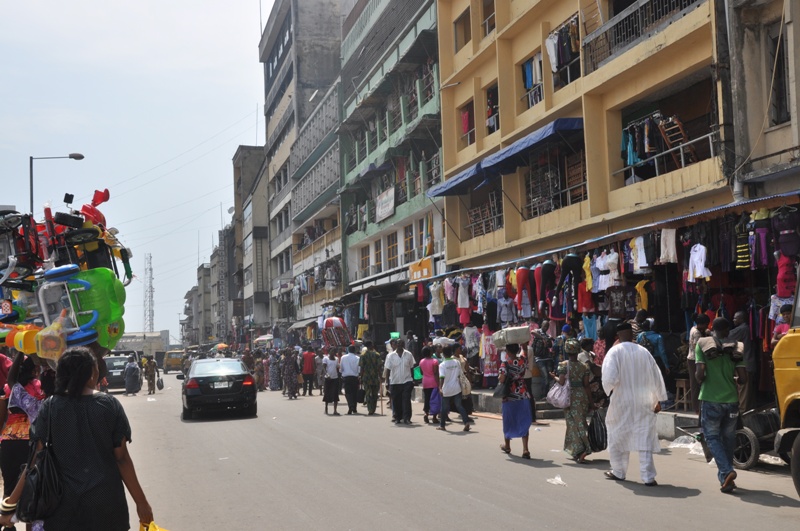By Olisemeka Obeche
Many Nigerians are lamenting over the worsening economic climate preceding the 2015 general elections, as pangs of austerity measures unleashed by Federal Government in the wake of crude oil price slump in international market spread through the economic landscape.
With the declining value of the Naira, poor power supply and the recent fuel scarcity already affecting household incomes, the lull in commercial activities across the country is already causing tension in the major markets in Nigeria.
Checks by theeconomyng.com in major markets in Lagos and other cities across the country revealed that traders are becoming increasingly frustrated by the lull in commercial activities, largely attributed to the electioneering season. “We have not seen this kind of bad market before. Everything is at a standstill,” declares Mr. Lawrence Okereke, an electronic dealer in Alaba International Market, Lagos.
Anthony Ekeh, a motor-parts dealer at Iyana-Itire, along Oshodi-Apapa expressway also shares similar experience, but attributed it to the six weeks postponement of general elections by the Independent National Electoral Commission (INEC). “We are having a bad spell in this market. You can see people hanging around and chatting in groups because there are no customers to attend to. And that is because of the shift in the election date,” he says.
“I don’t know why Jega didn’t finish the elections last February so that everything would return to normal. Now, it is only PDP, APC and their sponsors that are spending money which is not going round,” Ekeh adds.
Madam Mojisola, a trader in Balogun Market, Lagos Island reinforced this belief: “They are spending all the money for their campaign, making many people unable to shop now. And until this election is over, volume of sales would not pick-up,” she argues.
Mrs. Pamela Ukabi, who owns a fashion boutique in Surulere, Lagos decried what she called an increasing cost of the lull in her business. “We spend money to buy fuel at over N100 per litter for our generators and at the end of the day, we go home empty handed due to poor or no sale,” she said.
Mr. John Nwude whose container was recently cleared at the Wharf on arrival from China told theeconomyng.com that he is praying fervently for sales to pick up soon after the elections to enable him sell off the goods and service his loans.“I don’t know what I would do if the goods are not sold and I need to get my money back before the end of May because I need to pay back the loan I secured from a bank. A lot of people would lose their investment capitals if market fails to improve soon,” he says.
Mrs. Sarah Okon, who disclosed that she borrowed money from Lapo to upgrade her beer parlour in the New Year, said she was struggling to meet her loan repayment obligation following poor sales. “Unless there is great merriment after the elections and many people patronize us like they did during the Christmas festival, I will be in trouble because of this gbese (loan debt),” she laments.
Experts see longer gloom
While election cycle has taken much of the blame for lull in commercial activities across the nation, with most traders looking forward to bounty sales as from mid-April when the polls are over, economic experts have predicted a longer gloom. Mr. Olugbenga Adesanya, an energy economist, believes that the prevailing economic gloom orchestrated by slump in oil price would be felt beyond the election season because the oil price would not rally any time soon. “We must prepare our minds for a potential long-time decline in crude oil pricing because it is not going to rally up in one year,” he says.
Chief Eddie Iroh, former Director General of the Federal Radio Corporation of Nigeria (FRCN) also urges Nigerians to prepare for long period of austerity. According to him, those in position of authority should quickly fashion out a Plan B to help cushion the effects of the prevailing economic situation “because there will definitely be tough times ahead in the light of today’s realities in the oil market.”
Financial experts are already predicting tough times for small businesses in the country. This is because commercial and microfinance banks are diverting credits for lending to big businesses or investment windows with higher profit margins. “Definitely, businesses will suffer because of the exchange rate fluctuation that has reduced the value of the Naira. Apart from the problem of lending, businessmen would are likely to lose substantial amount of investment capital because of the unpredictability of the exchange rates and price volatility in the market,” Mr. Mathew Iheanacho, an investment banker says.
Mr. Emeka Madubuike, President of the Association of Stock Broking Houses of Nigeria (ASHON), also predicted that small businesses that require bank lending would find it difficult to thrive because most banks prefer to convert their monies into treasury bills which yield them 10 percent interest. “Since banks can get more profit from buying Treasury bill at 10 per cent rate than lending to the real sector, most of them tied their money to these bills. So, the banks feel secured to just put their money in treasury bills and get 10 per cent on it, rather than lending to the real sector,” Madubuike says.
[divider]


